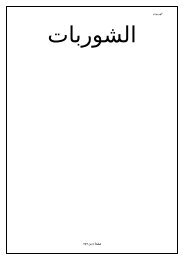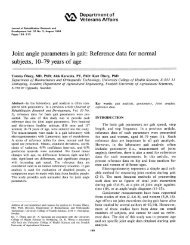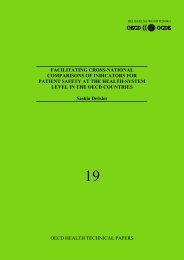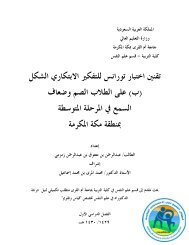- Page 1 and 2:
LONGMANENGLISH GRAMMARPRACTICEfor i
- Page 3 and 4:
Addison Wesley Longman LimitedEdinb
- Page 5 and 6:
Contents6 Adjectives so6.1 Formatio
- Page 7 and 8:
AcknowledgementsDifferent versions
- Page 9:
1 The sentence1.1 Sentence word ord
- Page 12 and 13:
1.2 The simple sentence: verbs with
- Page 14 and 15:
1.3 The simple sentence: direct and
- Page 16 and 17:
1.4 The compound sentenceWrite 2:Co
- Page 18 and 19:
1.5 The complex sentence: noun clau
- Page 20 and 21:
1.6 The complex sentence: relative
- Page 22 and 23:
1.7 The complex sentence: 'whose';
- Page 24 and 25:
1.8 The complex sentence: time, pla
- Page 26 and 27:
1.9 The complex sentence: reason an
- Page 28 and 29:
1.10 The complex sentence: purpose,
- Page 30 and 31:
1.11 The complex sentence: present
- Page 32 and 33:
1.12 The complex sentence: perfect/
- Page 34 and 35:
2.1 One-word nouns2.1 С Nouns and
- Page 36 and 37:
2.2 Compound nouns2.2C Compound nou
- Page 38 and 39:
2.3 Countable and uncountable nouns
- Page 40 and 41:
2.4 Countable and uncountable nouns
- Page 42 and 43:
2.5 Number (singular and plural) (1
- Page 44 and 45:
2.5 Number (singular and plural) (1
- Page 46 and 47:
2.7 Gender2.7ВStudy:i**iIdentifyin
- Page 48 and 49:
2.8 The genitive2.8CThe use of 's a
- Page 50 and 51:
3.1 The indefinite article: 'a/an'
- Page 52 and 53:
3.1 The indefinite article: 'a/an'
- Page 54 and 55:
3.1 The indefinite article: 'a/an'
- Page 56 and 57:
3.1 The indefinite article: 'a/an'
- Page 58 and 59:
3.5 The zero article (1)3.5B The ze
- Page 60 and 61:
3.5 The zero article (1)3.6C Zero a
- Page 62 and 63:
4.1 Personal pronouns4.1 С Gender
- Page 64 and 65:
4.2 'One'4.2C 'Which one(s)?' - 'Th
- Page 66 and 67:
4.3 'It' and 'one/some/any/none'4.3
- Page 68 and 69:
4.4 Possessive adjectives and posse
- Page 70 and 71:
4.5 Reflexive pronouns ('myself')4.
- Page 72 and 73:
4.6 Demonstrative adjectives/pronou
- Page 74 and 75:
5.1 Quantifiers + countable and unc
- Page 76 and 77:
5.2 General and specific references
- Page 78 and 79:
5.3 Uses of 'some', 'any', 'no' and
- Page 80 and 81:
5.4 'Much', 'many', 'a lot of, '(a)
- Page 82 and 83:
5.5 'Both' and 'all'5.5C 'Both' and
- Page 84 and 85:
5.6 'All (the)', '(a/the) whole', '
- Page 86 and 87:
5.7 'Another', '(the) other(s)', 'e
- Page 88 and 89:
6.1 Formation of adjectives6.1CComp
- Page 90 and 91:
6.2 Position of adjectives6.2C Adje
- Page 92 and 93:
6.3 Adjectives that behave like nou
- Page 94 and 95:
6.4 Adjectives after 'be', 'seem',
- Page 96 and 97:
6.5 The comparison of adjectives6.5
- Page 98 and 99:
7.4 Adverbs of frequency7.1 С Adje
- Page 100 and 101:
7.4 Adverbs of frequency7.2B 'Still
- Page 102 and 103:
7.3 Adverbial phrases of duration7.
- Page 104 and 105:
7.4 Adverbs of frequency7.4C Adverb
- Page 106 and 107:
7.4 Adverbs of frequencyWrite:Add q
- Page 108 and 109:
7.6 Intensifiers7.6B Adverbs in pla
- Page 110 and 111:
7.7 Focus adverbs7.7D 'Also' and 'a
- Page 112 and 113:
7.8 Viewpoint adverbs, connecting a
- Page 114 and 115:
8.1 Prepositions, adverb particles
- Page 116 and 117:
8.2 Prepositions of movement and po
- Page 118 and 119:
8.3 Particular prepositions, partic
- Page 120 and 121:
8.3 Particular prepositions, partic
- Page 122 and 123:
8.3 Particular prepositions, partic
- Page 124 and 125:
8.6 Phrasal verbs: Type 1, verb + p
- Page 126 and 127:
8.7 Phrasal verbs: Type 2, verb + p
- Page 128 and 129:
8.8 Phrasal verbs: Type 3, verb + p
- Page 130 and 131:
9.1 The simple present and present
- Page 132 and 133:
9.1 The simple present and present
- Page 134 and 135:
9.3 The simple past tense9.3C Uses
- Page 136 and 137:
9.1 The simple present and present
- Page 138 and 139:
9.5 The simple present perfect and
- Page 140 and 141:
9.6 The simple past perfect and pas
- Page 142 and 143:
9.7 The simple future tenseWrite:Su
- Page 144 and 145:
9.8 The simple future, the future p
- Page 146 and 147:
9.9 'Going to' and other ways of ex
- Page 148 and 149:
9.10 The imperative9.1 ОСStudy:Th
- Page 150 and 151:
10.1 'Be' as a full verb (1)10.1CSt
- Page 152 and 153:
10.2 'Be' as a full verb (2)Write:S
- Page 154 and 155:
10.3 'There' + 'be'10.3C Combinatio
- Page 156 and 157:
10.4 Verbs related in meaning to 'b
- Page 158 and 159:
10.5 'Have' as a full verb = 'posse
- Page 160 and 161:
10.6 'Have' as a full verb meaning
- Page 162 and 163: 10.7 'Do' as a full verb10.7B 'Do'
- Page 164 and 165: 11.1 The two uses of modal verbs4 I
- Page 166 and 167: 11.2 Uses of modals (etc.) to expre
- Page 168 and 169: 11.3 Uses of modals (etc.) to expre
- Page 170 and 171: 11.4 Uses of modals (etc.) to expre
- Page 172 and 173: 11.5 Uses of modals to express dedu
- Page 174 and 175: 11.6 Uses of modals for offers, req
- Page 176 and 177: 11.7 Expressing wishes, etc.: I wis
- Page 178 and 179: 11.8 Expressing preferences: 'would
- Page 180 and 181: 11.9 'It's advisable ...'/'It's nec
- Page 182 and 183: 11.10 'It isn't advisable ...'/'It
- Page 184 and 185: 11.11 Modals to express habit: 'use
- Page 186 and 187: 11.12 'Need' and 'dare' as modals a
- Page 188 and 189: 11.13 'Would/wouldn't'; 'that... sh
- Page 190 and 191: 12.1 General information about form
- Page 192 and 193: 12.2 Uses of the passive12.2C The p
- Page 194 and 195: 12.3 Form and use of the causativeW
- Page 196 and 197: 13.1 Yes/No questions, negative sta
- Page 198 and 199: 13.2 Alternative negative forms and
- Page 200 and 201: 13.3 Tag questions and echo tags13.
- Page 202 and 203: 13.4 Additions and responsesWrite:1
- Page 204 and 205: 13.5 Question-word questions (1): '
- Page 206 and 207: 13.6 Question-word questions (2): '
- Page 208 and 209: 13.7 Question-word questions (3): '
- Page 210 and 211: 13.8 Subject-questions: 'Who?', 'Wh
- Page 214 and 215: 14.1 Type 1 conditionals14.1 С 'If
- Page 216 and 217: 14.1 Type 1 conditionals14.2C 'If +
- Page 219 and 220: 14 Conditional sentences14.414.4ASt
- Page 222 and 223: 15.1 Direct speechWrite:15.1 СStud
- Page 225 and 226: 15 Direct and indirect speech15.3 I
- Page 227 and 228: 15 Direct and indirect speech15.4 I
- Page 229 and 230: 15 Direct and indirect speech15.5 U
- Page 231 and 232: 15 Direct and indirect speech15.6 W
- Page 233 and 234: 16 The infinitive and the '-ing' fo
- Page 235 and 236: 16.8 The to-infinitive or the '-ing
- Page 237 and 238: 16.8 The to-infinitive or the '-ing
- Page 239 and 240: 16.8 The to-infinitive or the '-ing
- Page 241 and 242: 16.8 The to-infinitive or the '-ing
- Page 243 and 244: 16.8 The to-infinitive or the '-ing
- Page 245 and 246: 16.8 The to-infinitive or the '-ing
- Page 247 and 248: 16.8 The to-infinitive or the '-ing
- Page 249 and 250: IndexAa/an. 3.1-2: general statemen
- Page 251 and 252: Indexcontinuous tenses - friendlyco
- Page 253 and 254: Index-ing form - Mr, Mrs, Dr, etc.-
- Page 255 and 256: Indexother - question tagsother: ot
- Page 257 and 258: Indexstatements-verbsstatements (co
- Page 259 and 260: Key to exercisesI The sentence1.1 S
- Page 261 and 262: Key 11.11A-11.13E1.5C Noun clauses
- Page 263 and 264:
Key 11.11A-11.13E1.10 The complex s
- Page 265 and 266:
Key 11.11A-11.13E2.3 Countable and
- Page 267 and 268:
Key 11.11A-11.13E3.1 С Describing
- Page 269 and 270:
Key 11.11A-11.13E4.2B 'One' and 'on
- Page 271 and 272:
Key 11.11A-11.13E5.3 Uses of 'some'
- Page 273 and 274:
Key 11.11A-11.13E6.3C Context1 the
- Page 275 and 276:
Key 11.11A-11.13EWrite 2:1 ... for
- Page 277 and 278:
Key 11.11A-11.13E7.8 Viewpoint adve
- Page 279 and 280:
Key 11.11A-11.13E8.7D ContextI (-)
- Page 281 and 282:
Key 11.11A-11.13E9.5 The simple pre
- Page 283 and 284:
Key10.1 A-10.3D10 Be, Have, Do10.1
- Page 285 and 286:
Key 11.11A-11.13E10.7 Do' as a full
- Page 287 and 288:
Key 11.11A-11.13E11.5 Uses of modal
- Page 289 and 290:
Key11.11A-11.13E11.11 Modals to exp
- Page 291 and 292:
Key 11.11A-11.13EWrite 2:1a She had
- Page 293 and 294:
Key11.11A-11.13E13.5 Question-word
- Page 295 and 296:
Key14.1 A-14.3A14 Conditional sente
- Page 297 and 298:
Key15.1B-15.3A15.1B Quotation marks
- Page 299 and 300:
Key15.5B-16.1C15.5B Offers, suggest
- Page 301 and 302:
Key 11.11A-11.13E16.4B Adjectives w


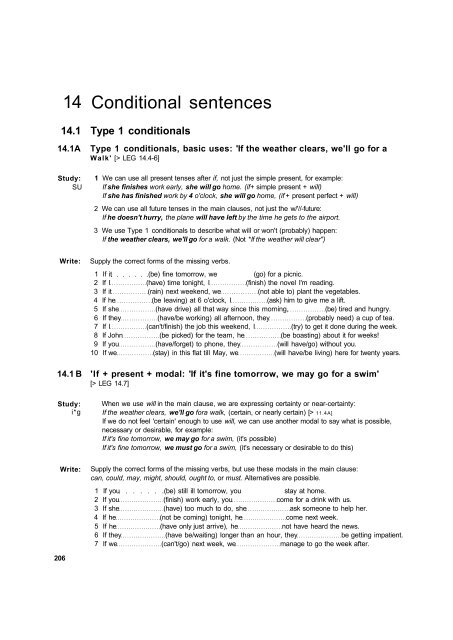

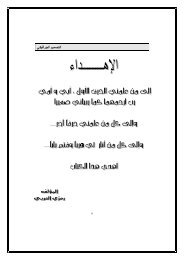
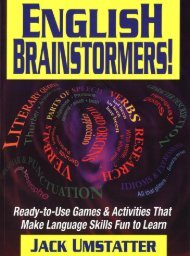
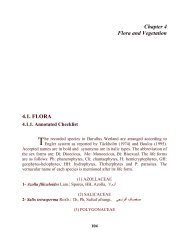

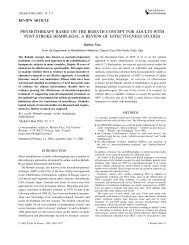
![Successful Ministry to the Retarded[ETowns] - Elmer Towns](https://img.yumpu.com/47721906/1/190x252/successful-ministry-to-the-retardedetowns-elmer-towns.jpg?quality=85)
